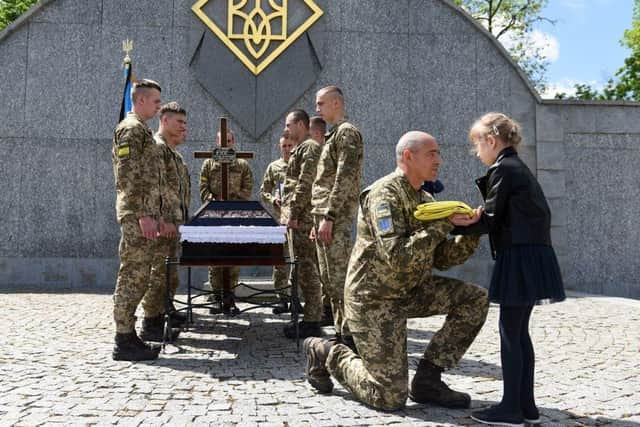Ukraine-Russia: Sweden to apply for Nato membership as Ukraine claims successes in Kharkiv region
It comes as the UK Ministry of Defence said Belarus was lining up troops along its border with Ukraine, in a bid to distract Ukrainian troops and force them to divert manpower from the Donbas region.
Belarusian president Alexander Lukashenko spoke at a meeting with Russian president Vladimir Putin and leaders of Armenia, Kazakhstan, Kyrgyzstan and Tajikistan, to call for the countries – known as the Collective Security Treaty Organisation – to unite against the West.
Advertisement
Hide AdAdvertisement
Hide AdMr Lukashenko, who has been dictator of Belarus since 1994, said the West was attempting to weaken Moscow through supporting Ukraine.


Mr Putin said Sweden and Finland’s decision to apply for Nato membership did not create a “direct threat” for Russia.
He said: "Russia has no problem with those states, so there is no direct threat from expansion to those countries. But deploying military infrastructure will provoke a response … based on the threats they create for us."
Meanwhile, a security intelligence firm warned the countries’ decision to join Nato was likely to spark cyber attacks from Russia, but said they were likely to have little effect.
Henry Wilkinson, chief intelligence officer at security intelligence firm Dragonfly, said: “Most immediately, we anticipate increased hostile cyber and political activity by Russia against both Finland and Sweden, particularly aggressive misinformation and intimidation campaigns. We also expect intensified efforts by Russia to target Nato member states which it sees as more vulnerable to weakening popular or political support for Nato expansion.
"Disinformation campaigns by Russia are unlikely to destabilise Finland or Sweden, such as by prompting unrest due to divisive messaging, let alone derail any Nato accession.”
On the ground, Ukrainian troops resisted attempted Russian advances and even rolled back front lines. In a small, but symbolic boost for Ukrainian morale, a patrol of soldiers recorded triumphant video of their push right up to the Russian border in the region of Kharkiv.
Ukrainian forces have already driven Russian troops back from the region's capital, reducing their ability to hit the battered city with artillery. As fighting raged, international efforts to respond to Russia's aggression continued to pick up pace.
Advertisement
Hide AdAdvertisement
Hide AdNato's secretary-general Jens Stoltenberg has said the membership process for both Finland and Sweden could be very quick, though member Turkey has cast doubts over the move.
Swedish Prime Minister Magdalena Andersson said joining the 30-member military alliance was her country's best defence in the face of Russian behaviour.
"Unfortunately, we have no reason to believe that the trend [of Russia's actions] will reverse in the foreseeable future," she said.
As well as sending military aid to Ukraine, Europe is also working to choke off funding for the Kremlin's war, by reducing the billions of dollars it spends on imports of Russian energy.
But a proposed EU embargo on imports of Russian oil faces opposition from a small group of countries led by Hungary, which is one of a number of landlocked countries that are highly dependent on the imports, along with the Czech Republic and Slovakia.
Bulgaria also has reservations.
"We will do our best in order to deblock the situation," EU foreign policy chief Josep Borrell said. "I cannot ensure that it is going to happen because positions are quite strong."
Western weapons deliveries to Ukraine and sanctions against Russia have helped the outgunned and outnumbered Ukrainian forces bog down the Russian advance – and even turn it back in places.
Mr Stoltenberg said on Sunday the war was “not going as Moscow had planned".
Advertisement
Hide AdAdvertisement
Hide Ad"Ukraine can win this war," he added – a remarkable assessment that would have been unthinkable for many on the eve of the invasion.
But Russia has been plagued by a series of setbacks, most glaringly in its failure to overrun Kyiv, the Ukrainian capital, in the early stages of its February 24 invasion.
Since then, much of the fighting has shifted to the Donbas, Ukraine's eastern industrial heartland. Determining a full picture of the unfolding battle there is difficult.
Air strikes and artillery barrages make it extremely dangerous for reporters to move around, and reporting is restricted by Ukraine and the Moscow-backed separatists it has been fighting in the Donbas for eight years.
The battlefront in the east and south of Ukraine extends over hundreds of miles, stretching men, machines and resources. The two sides have been fighting village by village in parts.
Ukrainian forces have ground down the Russians, but are taking losses too. In the Luhansk region of the Donbas, strikes overnight hit a hospital in Severodonetsk, killing two and wounding nine, including a child, the regional military command said on Monday. Overnight strikes also hit other towns.
Regional military governor Serhiy Haidai said Ukrainian special forces blew up Russian-held railway bridges as part of efforts to slow the Russian offensive. The information could not immediately be independently verified.
Meanwhile, in the south, a strike on Monday wounded three people in the Odesa region.
Advertisement
Hide AdAdvertisement
Hide AdVisitors who would normally fill the city of Odesa as the tourist season kicks off at this time of year are absent, and the streets of the usually lively city are quiet.
In a symbolic boost, a Ukrainian patrol in the Kharkiv region reached the Russian border and made a victorious video there addressed to President Volodymyr Zelensky.
Russian troops have also continued air and artillery strikes around the Azovstal steel plant in Mariupol – the last holdout of several hundred Ukrainian forces in the strategically important city, the Ukrainian General Staff said.
In an online news conference, many wives of the besieged soldiers urged the international community to help gain the release of "the entire garrison", which is suffering from a dire lack of food, water and medicine.
Comments
Want to join the conversation? Please or to comment on this article.
